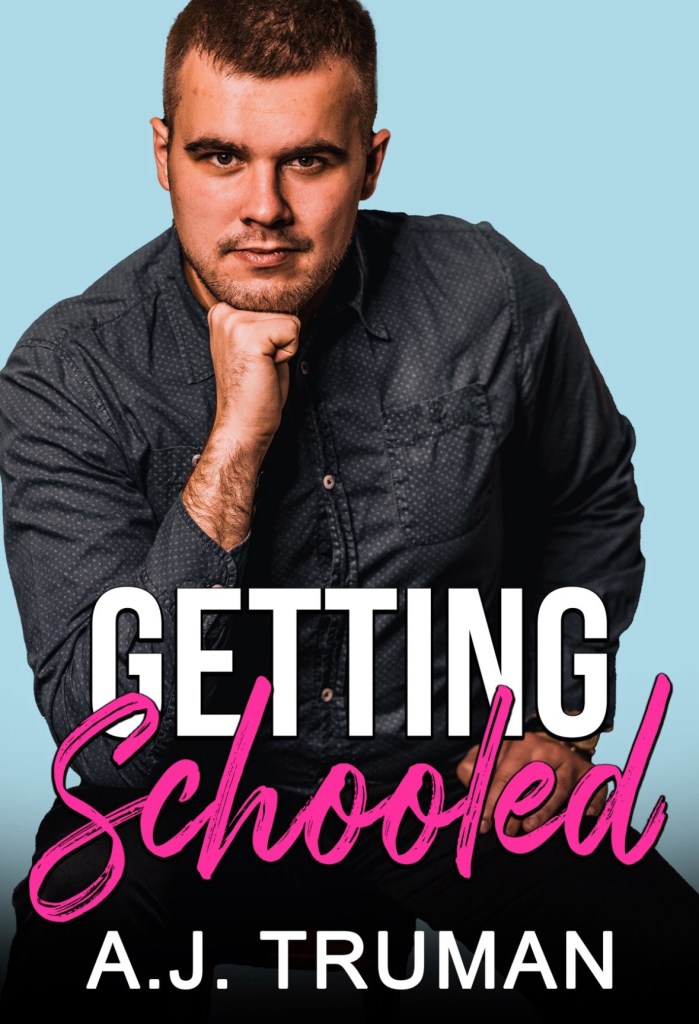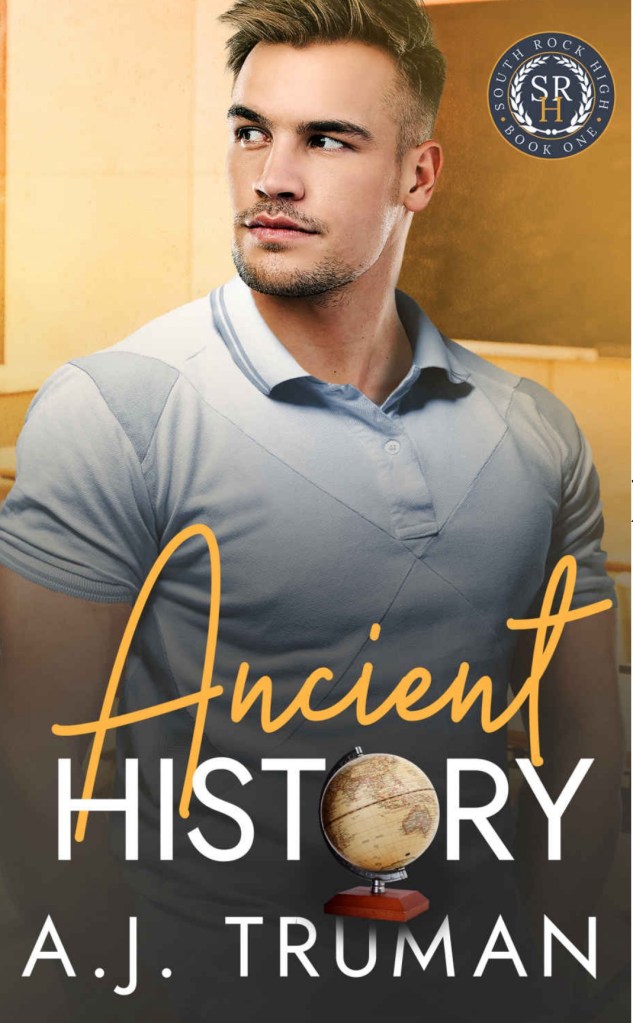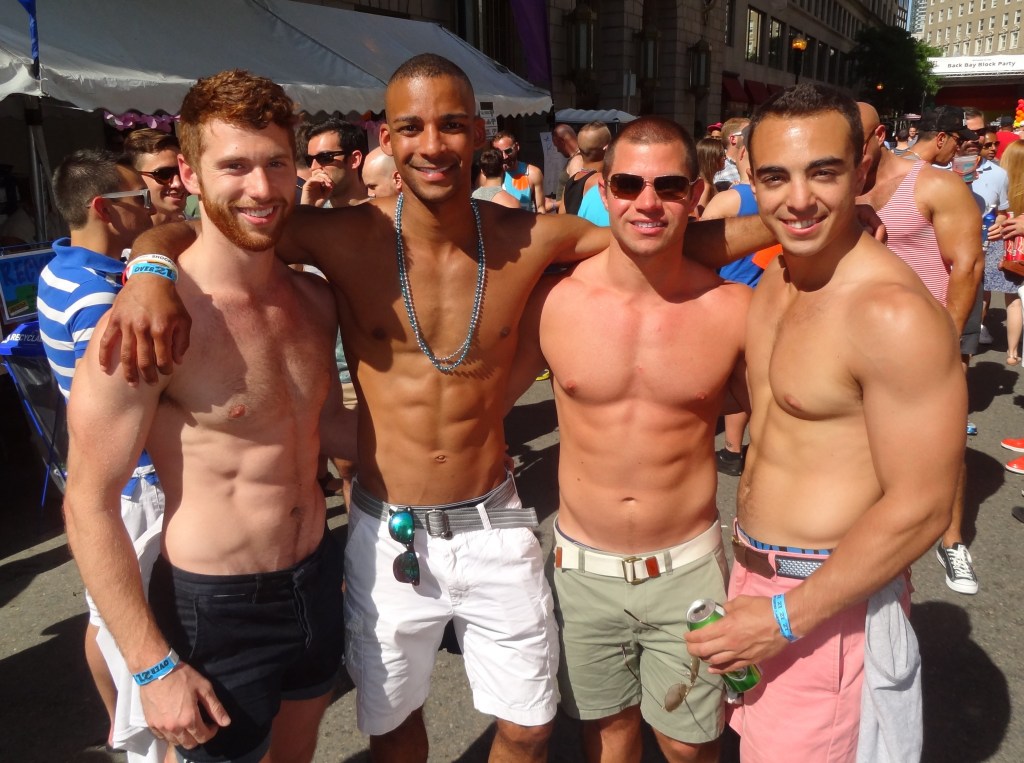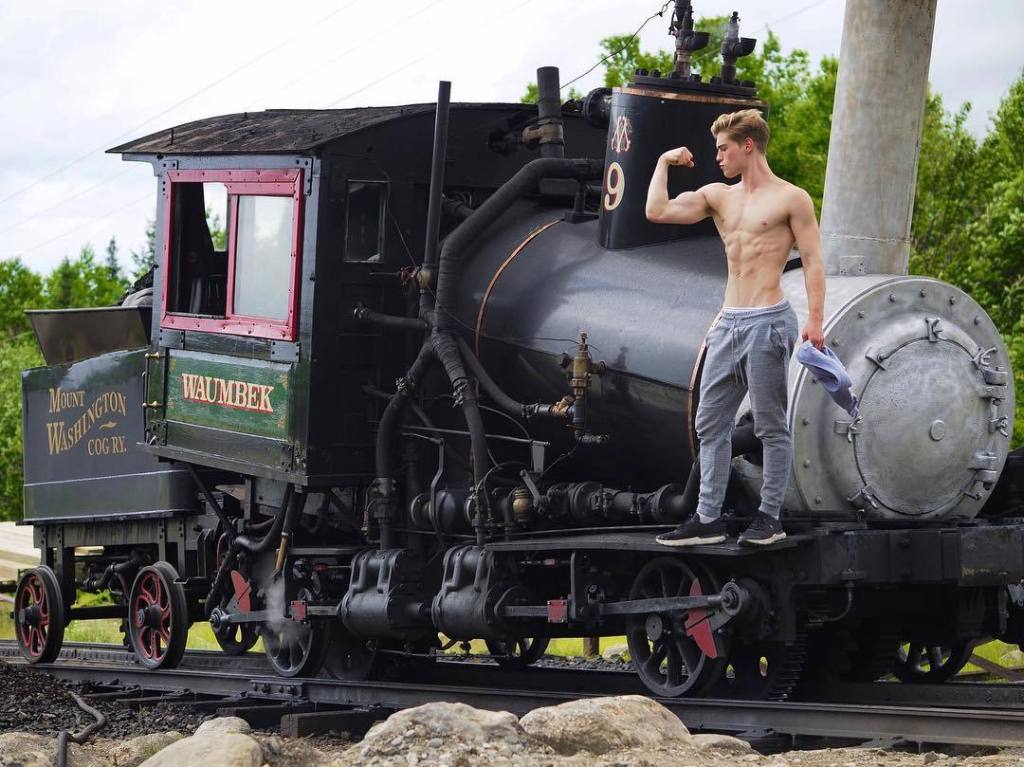






Warning: This post will be more graphic and talk about sex much more than I usually do.
The picture above is often a meme saying, “That Tasted Nothing Like Pineapple.” I’ve been reading a lot of gay romance books lately, and there are a few things that always make me roll my eyes when I read them.
The first one is when characters have a hands-free orgasm while having anal sex. Many of us know that being the bottom during sex can be a truly wonderful experience, but for me, it’s never been so outstanding that it caused me to have an orgasm with out any stimulation to my dick. Just saying. While I know it’s possible, it certainly doesn’t happen in the frequency it does during m/m romances. I know it’s a plot device to show that the sex is earth shatteringly good, but my goodness, these authors need to lay off on the hands-free orgasm. If a man did it as many times as some of the characters in these books, it’s more likely that they suffer from premature ejaculation instead of mind-blowing sex.
The other thing is that precum and cum is always referred to as tasting bitter. In real life people often describe semen as tasting salty, sweet, bitter, metal, sharp, or sour. The bitterness or saltiness because it has a more alkaline pH. The sweetness can be attributed to greater sugar content, especially glucose and fructose which give sperm their energy to move. One study suggested that people with diabetes may secrete more sugar into their semen giving it a sweeter taste. A metallic taste is because of the minerals and vitamins it contains.
In my personal experience, and maybe yours have been different, I’ve never experienced a man’s semen to taste bitter. These m/m romance authors mostly say that cum is bitter but also often say that it is salty, and that I can agree with. For me, I’ve usually thought that cum had a gamey or sweet taste, or maybe salty sweet. Precum has always tasted sweet to me. I’ve never considered it to be bitter. The truth is that the taste of semen varies from person to person.
Although many people insist that certain foods change the taste of their semen, there is no conclusive research to confirm this link. Anecdotally, some people believe that fruits, such as citrus fruits and pineapple, may improve the flavor of semen. Foods that produce a strong odor, such as broccoli and cauliflower, may make semen taste or smell worse. Likewise, foods that tend to change the appearance or smell of other bodily fluids, such as asparagus, may also change the taste of semen. One thing that does alter the taste of a man’s semen is hygiene. It is well established that taste and smell are linked, and in consequence, funky body odor can lead to it tasting funky.

With all that being said, out of my own curiosity, I pose the following questions: Does cum have a bitter taste like so many authors claim? I don’t understand why they always describe it as bitter. Why not say cum has a salty sweet flavor? Authors could describe the taste of cum in differing ways, yet they almost universally say it’s bitter.

Since I started back to being able to actually read books, because improvement with my headaches, instead of only listening to audiobooks, I’ve been reading a series of male/male romances called “Vino & Veritas.” The series has one pre-series book (Roommate by Sarina Bowen), nineteen books with in the original Vino and Veritas series (two of the books are female/female romance, which I skipped) and an additional six books in the “In Vino Veritas” series. The description of the series says:
Welcome to Vino & Veritas, your new favorite LGBTQ+ friendly and inclusive bookstore and wine bar in Burlington, Vermont! Have a seat at the bar, or browse the aisles. There’s romance lurking behind every corner…
Two things drew me into this series from the beginning: it takes place in Burlington and it’s about an inclusive bookstore and bar. I wish Vino & Veritas really existed in the Church Street Marketplace, but sadly, it’s all fictional. With twenty-seven books, there are some good and some not so good. Each of the books is written by a different author. There are very few of them, besides the lesbian ones, that I would not recommend. Some stand out more than others.
The books by J. E. Birk are particularly good because she was raised in Vermont, and the real familiarity with Vermont makes a difference. She has also started another series “Devon Falls” which continue to take place in this fictional Vermont, though not centered around the Vino and Veritas bookstore and wine bar. Most of the other books are written by women (most m/m romance authors are women) who have probably never been to Vermont, but most have done their research. Vermont is a quirky place, and in the books where Vermont itself feels like a character in the book instead of merely a backdrop are the best in my opinion.
When I finish the book I’m currently reading, Unforgettable by Marley Valentine (I find it funny that I just happened to start this book on Valentine’s Day), I have two more books in the series. Then I’ll move on to the “In Vino Veritas” series.

When Jesus therefore saw His mother, and the disciple whom He loved standing by, He said to His mother, “Woman, behold your son!” Then He said to the disciple, “Behold your mother!” And from that hour that disciple took her to his own home.
—John 19:26-27
The other day, I came across a book on Amazon titled Called Out: 100 Devotions for LGBTQ Christians by E. Carrington Heath. I have some other LGBTQ+ devotional books, but I knew I liked this one as soon as I opened it up. The first devotional is “Chosen Family,” and the biblical text with it is John 19:26-27. The scene in the verses is while Jesus is on the cross and is followed by Jesus saying he is thirsty and being given vinegar to drink. Then in John 19: 30, Jesus said, “‘It is finished!’ And bowing His head, He gave up His spirit.” The last thing Jesus did before he died was to give the two people who meant the most to him, his mother and John, whom He loved, a family without him.
Our biological families are not always caring and loving; far too often they can be cruel and harmful to us. LGBTQ+. Too many LGBTQ+ individuals of all ages choose to end their lives because they are not accepted by their biological families. The luckier LGBTQ+ individuals either have loving and accepting families, or they are fortunate enough to find a chosen family who will love, accept, support, and nurture them. Jesus give us that example in the Gospel of John. I will not dive into the times that Jesus declares his love for specific men but will focus on Him choosing a family for his mother and “the disciple whom He loved.” In the devotional from Called Out, Rev. Heath writes, “One of the queerest things we can do is, one of the most Christian: create a family of people you love, and the ones who love you.”
The Rev. Dr. E. Carrington Heath (they/them) is the Pastor of the Congregational Church in Exeter, New Hampshire. Founded in 1638, the church is a parish of the United Church of Christ. Called Out: 100 Devotions for LGBTQ Christiansis Rev. Heath’s third book. Their two previous works were published by Pilgrim Press under the name “Emily C. Heath”. Glorify: Reclaiming the Heart of Progressive Christianity is a call to vibrant discipleship in the mainline church, and Courageous Faith: How to Rise and Resist in a Time of Fear is an examination of what it means to be brave in difficult times.

I recently finished Madeline Miller’s The Song of Achilles. It’s a beautifully written book that follows the events of Homer’s The Iliad and the Trojan War through the eyes of Achilles’s lover Patroclus.

A tale of gods, kings, immortal fame, and the human heart, The Song of Achilles is a dazzling literary feat that brilliantly reimagines Homer’s enduring masterwork, The Iliad. An action-packed adventure, an epic love story, and a marvelously conceived and executed page-turner, Miller’s monumental debut novel has already earned resounding acclaim from some of contemporary fiction’s brightest lights—and fans of Mary Renault, Bernard Cornwell, Steven Pressfield, and Colleen McCullough’s Masters of Rome series will delight in this unforgettable journey back to ancient Greece in the Age of Heroes.
Throughout history, there have been debates over the nature of the relationship between Achilles and Patroclus. Were they lovers? Were they the same age? All sources claim that Achilles had a great love for Patroclus; the question is: were they romantic? Plato believed they were lovers, and it appears that most ancient Greeks felt the same way. Also, ancient sources usually agree that Patroclus was the older of the two and that the relationship was pederastic. Miller, however, writes that they are the same age. and The Song of Achilles is about the romantic relationship between the two men.
As a historian who has studied and is fascinated by Ancient Greece, I find Miller’s portrayal of the story fascinating. The Iliad is far from the only source for the mythology of Achilles, and many of those sources vary greatly from one another. Miller is able to take the various stories and show how they can all be accurate from various perspectives. For instance, in the story of Agamemnon, the leader of the Greeks, the king sacrifices his daughter for victory in Troy. (In Aeschylus’s play Agamemnon, this is one of the reasons his wife Clytemnestra murders him.) The daughter, Iphigenia, is brought to him in Aulis to be married to Achilles but secretly to be sacrificed to the goddess Artemis. Various sources say she knew she was to be sacrificed and did so willingly; others sources say she did not know. In
The Song of Achilles, Miller weaves together the stories in a way to make both stories appear to be true. When the Greeks are horrified by the murder, Agamemnon claims Iphigenia knew her fate and sacrificed herself willingly. However, Achilles was close enough to see the shock on her face when she was killed. It really is an interesting way to write the story, and that is just one example.
Reviewing The Song of Achilles for The Guardian, Natalie Haynes commended the novel as “more poetic than almost any translation of Homer” and “a deeply affecting version of the Achilles story.” Mary Doria Russell similarly praised the novel in her review for The Washington Post, favorably citing its “prose as clean and spare as the driving poetry of Homer.” In his review for The New York Times, Daniel Mendelsohn criticized the book’s structure and, in particular, its tone. He compared the book unfavorably to young adult literature, describing The Song of Achilles as “a book that has the head of a young adult novel, the body of the Iliad, and the hindquarters of Barbara Cartland.” He also compared the novel’s prose to SparkNotes and softcore pornography. I agree with Haynes and Russell’s assessments, but Mendelsohn couldn’t be further from the truth. There is nothing young adult about the book, and it is mostly certainly not softcore pornographic. In fact, the sex scenes are hardly explicit. The book is beautifully written, moving, and historically fascinating.
Miller’s book is beautifully written and is a new retelling of the famous relationship. The book was published in 2011, so it is hardly a new book, but I just got around to reading it. I you have not read it and have an interest in Ancient Greek mythology, I highly recommend it. If you have read it, what was your opinion of the book?
The Song of Achilles is available from Amazon in Kindle, audiobook, or paperback.

Early this week I finished listening to the audiobook of Rainbow History Class: Your Guide Through Queer and Trans History (Hardcover, Kindle, Audible) by Hannah McElhinney. The author began Rainbow History Class by posting one-minute videos on TikTok. Eventually, it grew into the book Rainbow History Class. The book is meant to be a crash course in LGBTQ+ history from the ancient world through to lesser-known moments in recent history. While there wasn’t much in this book that I did not know, McElhinney is Australian, so the parts about Australia’s LGBTQ+ history was definitely interesting and new information.
The book is well-written, and it is just as it is described, a crash course in LGBTQ+ history. However, at just 216 pages, it can’t come close to covering all of LGBTQ+ history (and it’s not meant to). McElhinney does a good job in delving into more detail about the vignettes in LGBTQ+ history that she chose to discuss.
Overall, I enjoyed the book and would recommend it.

I haven’t reviewed a book on here for quite some time, but I finished one yesterday that I absolutely loved. It started out a little slow, but I think it had good reason. By the time I finished it, I didn’t want it to be over. The book is The Place Between by Kit Oliver. I’d never read anything by Kit Oliver before, but it was included in Audible’s Plus Catalog, which means with my subscription, I could listen for free. After reading the description, I knew I wanted to read it. Here’s what the blurb said:
Will Ned finally get a relationship right – even if it’s fake?
Ned’s exhausted from his divorce, single parenting, and graduate school, so when his boss comes up with a plan to ‘improve’ work-life balance, Ned wants no part of it.
But Dr. Charles Henry Abbot, PhD has other ideas. Once Ned’s least favorite professor and now his infuriating colleague, Ned needs Abbot’s help editing his dissertation. With their newly limited work schedules, Abbot suggests the worst idea Ned’s ever heard: pretend to date. Convince their co-workers – and their boss – that they’re in a relationship and nailing this whole personal life thing . . . and each other.
It’s an awful idea, but, if it means a graduation cap, would faking a relationship be worth it, so Ned can finish his degree and move home to his daughter?
The Place Between is a steamy, m/m romance novel. If you like enemies to lovers, fake dating, and the thin line between bickering and flirting, then you’ll love this fast paced romance.
Buy The Place Between to watch Ned and Abbot’s fake relationship unfold as they stumble into the most real thing either of them has ever done.
First, I like the fake relationship to lovers genre of m/m romance. Boyfriend Material by Alexis Hall and Love Happens Anyway (A fake boyfriend for Christmas story) by RJ Scott are two of my favorites. I have listened to Boyfriend Materialat least twice, and I have listened to Love Happens Anyway every Christmas since I first read it. Usually, my friend Susan suggests m/m romance books to read, and she’s an excellent judge of a good book. There are times that I have liked a book that she didn’t, but rarely (if ever) have I not liked a book she recommended to me.
Anyway, I don’t want to give too much away about The Place Between, but I do want to tell you about one scene that really hit home for me, and Oliver describes in such real detail, that I wonder if he has experienced something similar himself. In the book, Ned defends his dissertation (I’m not giving anything away; it was bound to happen in the book). When he walks out of his defense, he’s a bundle of nerves. He second guesses himself and feels like he’s going to vomit any minute. While I never defended my dissertation, because I never finished it, I did take the comprehensive exams for my PhD: four days of written essays and two hours of an oral exam. The professors on my committee could ask me anything, and while I knew I had done very well on the written exams (one professor told me that she’d heard they were the best any of the professors on my committee had read), the oral exams were a different story.
When I was in graduate school, I was not a very confident person. I hated speaking in front of professors. I could speak to a classroom of students, but when it came to professors, I always felt like I couldn’t put together a coherent sentence. It wasn’t true and I wish someone had told me that back then and encouraged me more, but no one did. Sadly, it’s not the way graduate school often works. I am far more confident now, and doctorate or not, I have no problem talking in front of professors and teaching their classes. But back then was a completely different story. I stuttered and stammered through my oral exams. It was beyond awful, though I found out later, that they thought I’d done fine. They had decided after reading my written exams that I’d pass no matter what, so the oral exams were just a formality. I knew most of the answers I was asked during the oral exams with the exception of one question from the Europeanist on my committee, but I don’t feel bad about that since the Americanists all apparently said afterwards, “What the fuck was she talking about?”
Anyway, when I walked out of that conference room after that oral exam and knew the professors who’d just grilled me with questions was determining my fate, I was a mess. My friend Tony said that I was white as a ghost, and he was worried I’d either pass out or throw up. Luckily, I did neither and shortly afterwards they called me back in. Apparently, they had been talking about other things since they’d decided my fate before I went into the oral exams. I knew I had to sit one on one with another professor for the women’s history portion of my oral exams (she was not able to make it up on the day of my exam). I was not too worried. We sat and had coffee while she asked me questions, and it went much more smoothly.
So the scene when Ned defends his dissertation is one that really resonated with me. I really did love the book. I usually listen to books only in my car, but this one, I spent yesterday listening to because I just couldn’t stop myself, and I was sad when I finished it. Reading this book, I laughed, and at times, I even got a little teary eyed. I felt a whole range of emotions reading this book, and for me, that’s always a mark of a great writer. The only drawback to the audiobook is the way the narrator voices Abbot. Though it fits with the character somewhat, I think the voice was just too monotoned and unemotional. Otherwise, I think Jeremy Frazier, the books narrator, does an excellent job. At 12 hours and 55 minutes, it’s a long audiobook, but if you are like me, you will not want it to end.
If the book sounds interesting to you, I hope you will either read or listen to it. It’s available in Audible Plus and Kindle Unlimited. Also, there is a short coda (or extra chapter) to download when you finish the book.
⭐️⭐️⭐️⭐️⭐️

I forgot to write a post last night before I went to bed. Sorry. I don’t have a lot to say, but I will give a book recommendation. This morning on my way to work, I finished listening to The Best Cook in the World by Rick Bragg. Years ago, I had read his book All Over But the Shoutin’ and loved it. A friend of mine suggested that I would like The Best Cook in the World because I love southern cooking and had written and had published an essay about the recipes my grandmother handed down to me. If you have an interest in southern cooking, I think you’ll like this book. Because it reminded me of my grandmother’s cooking, there were parts of the book that brought tears to my eyes as I remembered her, and then, there were the stories of Bragg’s relatives that often had me laughing out loud until I cried. The book really is a masterpiece of southern folklore, stories, and recipes, and yes, the recipes are included in the book. You can buy the hardcover, Kindle, or paperback and have access to the recipes written down, or you can do like I did and listen to it on audiobook with Bragg reading it. In my opinion, it is well worth it. While some of the recipes are done a bit differently from the way I learned them, this book took place in the hill country of north Alabama and not in the Black Belt of south central Alabama where I grew up. I still got a lot of enjoyment out of it, and it brought back many memories of my childhood in Alabama watching my mother and grandmother cook.

Other than anywhere in the state of Maine (the only New England state I have not visited), I have wanted to visit Mount Washington in New Hampshire, which is called Agiocochook by some Native American tribes. Mount Washington is the highest peak in the Northeastern United States at 6,288.2 ft. and the most topographically prominent mountain east of the Mississippi River. The mountain is notorious for its erratic weather. On the afternoon of April 12, 1934, the Mount Washington Observatory recorded a windspeed of 231 mph at the summit, the world record from 1934 until 1996. Mount Washington still holds the record for the highest measured wind speed not associated with a tornado or tropical cyclone. The mountain is located in the Presidential Range of the White Mountains, in Coös, New Hampshire.
A few years ago, I read Jamie Fessenden’s Murder on the Mountain, a gay mystery novel that takes place on and around Mount Washington. Here is the publisher’s summary:
When Jesse Morales, a recent college grad who aspires to be a mystery writer, volunteers to work on the summit of Mount Washington for a week, he expects to work hard. What he doesn’t expect is to find a corpse in the fog, lying among the rocks, his head crushed. The dead man turns out to be a young tourist named Stuart Warren, who strayed from his friends while visiting the mountain.
Kyle Dubois, a widowed state police detective, is called to the scene in the middle of the night along with his partner, Wesley Roberts. Kyle and Jesse are instantly drawn to one another, except Jesse’s fascination with murder mysteries makes it difficult for Kyle to take the young man seriously. But Jesse finds a way to make himself invaluable to the detective by checking in to the hotel where the victim’s friends and family are staying and infiltrating their circle. Soon he is learning things that could very well solve the case–or get him killed.
Fessenden lives in New Hampshire, where several of his books take place. Murder on the Mountain is a mystery and gay romance, which is always fun. It is also my favorite of Fessenden’s books. I rarely read books more than once, but this one I have. It’s always enjoyable, and it got me interested in Mount Washington.
The Mount Washington Cog Railway, also known as the Cog, ascends the mountain’s western slope. The Cog is what attracted me to want to visit Mount Washington. I’ve always loved trains, and the Cog is a historic and interesting locomotive. Built by Sylvester Marsh between 1866 and 1869, the Cog is the world’s first mountain-climbing cog railway (rack-and-pinion railway). The railway is still in operation. It uses a Marsh rack system and both steam and biodiesel-powered locomotives to carry tourists to the top of the mountain.
The steam locomotive above is the Waumbek built by the Manchester Locomotive Works in 1908 and is still in operation. In the picture above, you’ll notice how the boiler is tilted to compensate for the steep mountain grade of the tracks going up the mountain. The boiler needed to be even, so they tilted the boiler to compensate. The original locomotive #1 Hero (nicknamed Peppersass) first reached the summit in 1869. While it was primarily designed to build the railway, Peppersass saw passenger service until it was retired in 1878. Until 2008, the Cog was a steam railroad. As more locomotives were added over time, the wood-fired engines gave way to coal when the railway began to operate biodiesel engines. These engines were more economical, easier to maintain, and environmentally friendlier. The biodiesel engines take anywhere from 18-22 gallons of biodiesel fuel to complete the nearly 7-mile round trip; by comparison, the steam locomotives consume 1000 gallons of water and a ton of coal to make the same trip.

A few days ago, I finished Chasten Buttigieg’s autobiography, I Have Something to Tell You. I loved it, and I think you will too.
Chasten James Glezman was born on June 23, 1989. He shares his birthday with legendary bisexual sexologist Alfred Kinsey upon whose research the modern gay rights movement was built, and math-computer genius and gay martyr Alan Turing. During Pete Buttigieg’s campaign for the Democratic presidential nomination, Pete’s husband Chasten quickly became the campaign’s “not so secret weapon.” I followed Chasten on social media throughout Pete’s campaign and saw a few interviews with him especially those after his brother attacked him on Fox News. I found him charming, sweet, and funny, and I wanted to know more about this middle school drama teacher. That’s why I wanted to read his recently released autobiography, I Have Something to Tell You.
His story verifies much of what I thought I knew about Chasten. From his public appearances, social media, and broadcast interviews, he appears to be intelligent and funny, given to emotion, and passionate about kids especially LGBTQ+ kids, and his love for Pete. I think you too will find the book reinforces these impressions. I listened to it as an audio book; reading a physical book is often difficult because they tend to exacerbate my headaches, and it becomes difficult to focus my eyes to the words on page. Chasten narrated his biography. I think listening to him gave the book a richer meaning. You may remember I originally came to Vermont from Alabama for a position as an oral historian. Oral histories allow you to hear the person’s emotions, and that is precisely what you get with the audio version of I Have Something to Tell You.
Throughout the campaign, Chasten and Pete were criticized by groups like “Queers Against Pete” who trolled Pete and Chasten around the country from one campaign event to another always trying to shout them down. They gave various excuses for not liking Pete, but #1 among them was that the couple was not “gay enough.” What a crock of shit! They are two men married to each other. How much gayer can you get? Just as sexuality is on a spectrum so are gay men. Chasten and Pete are identified with a gay sophistication often derided by some in our community; however, Chasten’s roots are surprisingly middle America. He was reared in Chums Corner, Michigan (population 946), “a hop, skip, and a jump from rural farmland.” Both his parents had to work hard to make ends meet. He recalls simple meals like meatloaf, mashed potatoes, mac and cheese, canned tomato soup, peaches, and pears—and his mom Sherri, “in a bathrobe, her hair still wet from the shower getting her purse and writing us a check for school lunches in the mornings saying that it might not be enough.”
Growing up in rural Alabama, there are a lot of things I felt a connection to with Chasten’s story. He writes, “When fair time came around, I always felt so nervous and conspicuous. As you might suspect, the typical 4Her is a tough guy or wants to be. They present as very masculine, and I never did.” My parents forced me to play sports, but I was not the typical athlete. I was never very masculine, and like so many young sensitive boys who grew up as Chasten and I did, other boys noticed and pounced.
Also, like Chasten, I don’t remember “seeing” any gay people in person growing up. Just as Chasten relates in his book, I remember vividly the words fag, faggot, and sissy, and all the many other descriptors for boys who were different, feminine, and soft. I remember being pushed around in the halls and treated differently from other guys. Chasten says in the book, “The classic move was to push me into a locker while calling me a “freak,” but the comments about my sexuality were much more hurtful than this general term. Something in those insults told me other kids knew more about me than I did myself, and I didn’t like it….” I remember feeling the same way.
The combination of terror in the hallways and the locker room, the dogma of Catholicism (for me it was the Church of Christ), our Republican communities (Alabama began to be more Republican as I got older), the country, and the world in general were all things with which many of us can identify. The constant message of what we were expected to be, but knowing we were different led to deep emotional scarring of our sense of self that negatively impacted our lives in multiple ways. Much of the first chapters can be summed up in this passage: “Fighting the waves of exclusion, I often felt like an undertow was pulling me away from everyone and everything.”
Chasten also struggled with student debt something he and Pete talked about on the campaign trail. I understood completely. After nine years of graduate school, I racked up massive student debt and couldn’t pay them when I got a job as a teacher which paid barely minimum wage. Chasten has also struggled with medical debt, something I too know very well as I have searched for treatments for my migraines. Before the Affordable Care Act, most insurance wouldn’t cover migraine medicine because it was a preexisting condition. And let me tell you, migraine medicines are expensive.
As painful as these struggles are to read and identify with, there were many funny moments. Chasten can throw shade. From his Tales of a Starbucks Barista: “Caramel Frappuccino perfectionists are a whole breed of human being [but they were] preferable to the Foam People….” There were fewer laughs regarding his doubts and fears from all the dead-end dates; like many of us, he was initially surprised to discover most men he met through apps had no interest in a committed relationship and family. We all know what most guys on apps really want even if they start out by saying they are looking for more.
The story of meeting Pete and their relationship was so sweet. You got a sense of just how laid-back Pete really is, but also of just how much they love each other. The two are quite different, but they seem a perfect match. They both had struggled with coming to terms with their sexuality, something many of us have experienced.
One of the remarkable things about the book is the campaign. You get to read about Chasten’s experiences trying to help LGBTQ+ kids accept themselves something still difficult for many in 2020. The Internet is full of pictures of young kids on the campaign trail locking eyes with Pete (who leaned over or knelt to their eye level as Chasten taught him to do). During the campaign, Chasten visited over 100 LGBTQ+ centers across America. Some of the campaign stories are extremely emotional; I was teary by the end of the book.
While I don’t see Chasten getting into politics for himself as he seems to prefer teaching, I do hope one day we see Pete serving this country in a greater capacity perhaps even as president. If you have any interest in Chasten or Pete Buttigieg, I urge you to get this book. It is beautifully written with an appealing and witty approach that comes across easily. It’s the story of a life that wasn’t always charmed or humorous, but instead a life with which I think many of us can identify. It’s just a damn good book, and I think you’ll enjoy it.
